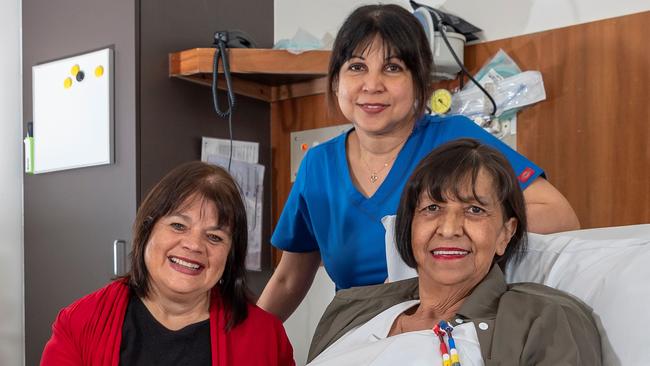Austin plan to connect with Aboriginal, Torres Strait Islander patients
Austin Health has released a plan a year in the making, hoping to boost health outcomes and job opportunities for Aboriginal and Torres Strait Islander people.

East
Don't miss out on the headlines from East . Followed categories will be added to My News.
Trauma is a major deterrent for many indigenous people who must use healthcare services and Austin Health is stepping up to make a difference.
The Heidelberg-based health service has developed its first reconciliation action plan for Aboriginal and Torres Strait Islanders.
The plan will increase the number of indigenous employees by 10 per cent, provide a program for Aboriginal and Torres Strait Islander students’ pursuing a career in health, and create four internship positions.
Julie Peers, who prefers not to be called Aunty, is a Ngemba woman and elder in the Aboriginal community who has been an Austin Health patient since 2004 when she received a liver transplant.
Ms Peers said liver transplant unit social worker Cathy Bradley “is the reason I’m alive today”, having gained her trust and supporting her through the transplant process.
Ms Peers is part of the stolen generation and suffers from trauma after being shuffled through 14 schools by age 15 and many foster homes. It is difficult for her to trust social workers and institutions.
Her brother was abused as a child in institutional care and died at the age of 51. He couldn’t bring himself to attend a follow-up appointment after getting some polyps removed.
“By the time he did, he had final stage bowel cancer,” Ms Peers said.
MORE: FIRE IGNITES IN MAN’S CHEST MID-HEART SURGERY AT AUSTIN
SHOPPING CENTRES PLAGUED BY THEFT, ANTI-SOCIAL BEHAVIOUR
ABORIGINAL TREATY A STEP TO JUSTICE
“The Ngarra Jarra (Aboriginal Health) team follow up with patients if they don’t show up. It’s about really making people feel safe.”
Austin Health chief executive Sue Shilbury said they would continue to work with key members of the indigenous community.
The action plan will be implemented over the next 12 months and be reviewed in March 2020.


